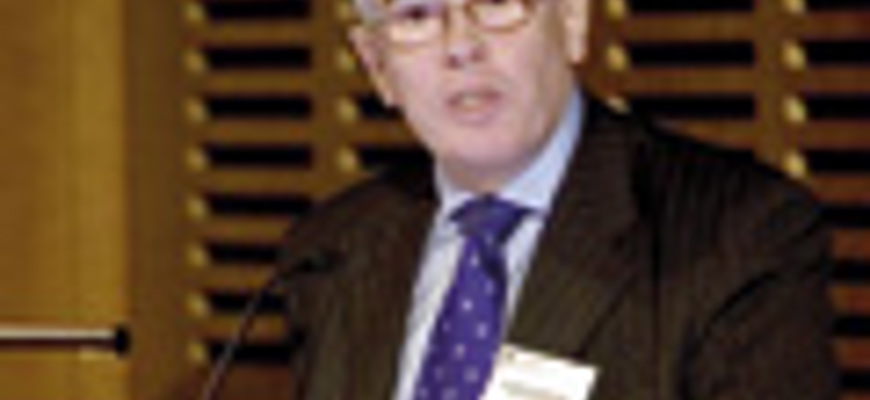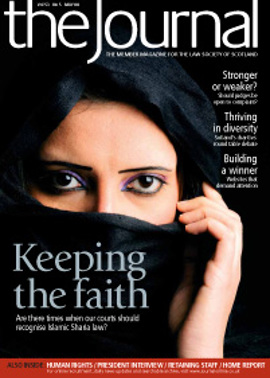Hands-on chief

Cometh the hour, cometh the man. Is it just coincidence, or was some guiding hand at work? Whatever the answer, the fact that the former senior government lawyer in Scotland is set to become the longest serving Law Society of Scotland President in modern times, at a pivotal moment in the history of the Society and the profession, is likely to be seen in retrospect as particularly valuable.
Not that Richard Henderson had much inkling of such an outcome when he assumed the vice presidency last May, on leaving his government post. His unexpected elevation less than four months later, brought to sudden public prominence someone who jokes that as a civil servant he “much preferred the shadows to the light”. However there can have been few periods in the Society’s history when an ability to get things done behind the scenes was a better qualification for its President that it is now.
It is instructive to hear Henderson describe, for example, the ongoing preparations for the Scottish Legal Complaints Commission. On the face of it, it is the Commission that has the onus of getting budgets, staff, rules and procedures ready for its target start date in October. But for the Society there remain the logistical issues of handing over one whole line of activity to the Commission, not to mention establishing ongoing relationships, and in particular preparing its own membership. “[The transfer] is logistically quite a complicated issue and it’s not been concluded yet, and things like the budget not being settled until the last point at which it could be done, create their own continuing logistical problems when you’re compressing activity into one of the busiest times of the year.”
Discovering policymaking
Coupled with that is the necessary work on defining professional standards. Not only has that required a lot of effort to redraw the previous “slightly opaque statements”; it has made the Society take a fresh look at its perhaps underdeveloped policymaking processes. “Having been on Council I’m not sure that we’ve done a lot of policymaking over the years”, Henderson comments, “and perhaps it hasn’t been necessary, but take ABS [alternative business structures] and take standards and you’re asking a body which sits at the centre of civic Scotland to take on a role that properly it should have anyway, to come up with policy proposals that affect the sector, and this is a pretty major shift for what the Society is doing.
“So in preparing policy you’re not only looking at what that policy might be, but you’ve also to ask yourself how you prepare policy. Things we’ve done like setting up a reference group including non-lawyers, clients who are affected by the policy, and getting them to do a critique as the policy is developed, those are fairly novel.”
Both the standards issue and ABS illustrate another point the President makes, that by their nature these are not one-off exercises but “iterative processes”. “The document that comes out in the consultation on standards may not meet people’s entire expectations; it may not be sufficiently developed. Equally for some people it may be overdeveloped. This is the first stage where you’re saying to the profession at large, there’s your starter for 10. That doesn’t mean that in 2010 people say we’ve done it, and in 2011 and on there’s no activity. I expect this type of activity to be a dynamic where the Society keeps under constant review what it’s setting out.”
The key to regulation
Similarly when I ask if the Society believes it has cracked the difficult issue of regulation in the ABS proposals coming before this month’s AGM, he responds: “You never come to a stage where you’ve reached a final solution, and ticked the boxes that way. We came up with a discussion document, which highlighted three models… But the particular models can only be examples of the way people might want to operate. None of us can say how exhaustive those models might be.
“The key is to develop a regulatory regime. Until now the regime for lawyers has generally been in relation to individuals. That doesn’t really relate to the way in which business works.”
The way forward, he continues, is to regulate the entities that deliver a service, whatever form they take. “If you’re talking about beginning to regulate the LDP, MDP and external capital, you have to ask, what regime will apply that can regulate that or any other entity solicitors might adopt? What we’ve done is to say we’ll regulate the entity, and provide some clues as to what the issues might be. Assuming that the profession signs up for this, which is the important stage, the next stage is to go on and say let us now, in the context of MDPs, begin the conversation with other sectors – financial services, accountants, surveyors and others – to broker a solution amongst ourselves in relation to the new possibilities.”
The Scottish Government’s insistence that there is no need for an England & Wales-style Legal Services Board in a jurisdiction the size of Scotland creates further challenging possibilities for the Society. Henderson admits that he doesn’t have a template for what would exist in place of such a Board, but believes in partnership working with other institutions – within the legal community and from the other professions – “to broker solutions that ensure that in terms of admission to legal practice we have flexible and transparent systems”.
Could the Society, if it found an imbalance between its membership and those it regulates, be forced to split in order to carry on its functions, like its counterpart to the south? “I think it would be regrettable if a professional body felt it ought to split its representational from its regulatory functions. I say that because I think that being a profession, to the extent that it’s a relevant idea nowadays, involves not simply the protection of the individual interests of members of what would otherwise be a trade association, but the recognition of the public interest…
“If you split representation from regulation, what you tend to get is a kind of bureaucratic structure in regulation lacking flexibility, and within the representational side a fall-away of an important part of professionalism, and that is the aspirational. The profession is a profession because it has values, it has aspirations for the future and those aspirations are for the way in which that regulated area of service can best be provided for the public.”
Confidence in the future
Taking up the theme of this year’s conference, “The Legal Profession in Five Years’ Time”, how does Henderson himself see the future for solicitors, and their professional body? He admits to taking some inspiration from keynote speaker Richard Susskind’s articles in the Times last autumn, talking about the end of lawyers (“I thought there’s a lot of stuff in there that I agree with and that lawyers should be thinking about”), but in a positive vein. “Do I think we will have lawyers in five years’ time? Yes. Do I think that there will be a Law Society of Scotland? Yes. Do I think it will have an expanded role? I think it should have an expanded role, but I don’t see it having imperialist ambitions. I see it fulfilling a role which society should want from a law society or bar association anywhere.”
Conceding that the profession may feel itself “slightly undervalued” after recent controversies, Henderson hopes that in five years’ time it will remain “confident of its place in Society, continuing to be able to meet the needs, the demands that are put on it, and fulfilling what I think is its correct role”. One thing that should help achieve this is next year’s conference, a special one for the whole legal community in Scotland to mark the Society’s Diamond Jubilee.
Like his predecessors, the President has a firm belief in the value of the “badge” of Scottish solicitor, which is recognised, he says, even beyond our borders. “That’s not simply the training: I think it’s the realisation that we have a professional body which is committed to excellence and providing value; and does not just profess integrity but has real integrity…. Just as the other badges in Scotland have similar resonance: the Faculty of Advocates has a resonance, there’s no doubt about that, the WS Society, SSC, the Royal Faculty, all of these are resonances and it would be reckless of us to say, we’re going to sweep everything away and start again. I do see in five years’ time there being a Law Society, I see strong local faculties, regenerated local faculties, I see the badges that we have being valued as they are now and much more.”
Just a job
With the Society now in the midst of its strategy and governance review, one thing Henderson is anxious to ensure is that his tenure is not regarded as setting a precedent, in terms of the time commitment at any rate. “I think it’s very important for a body like the Society actually to be able to engineer its arrangements in such a way that the example that I have set does not have to be replicated. It would be terrible if anybody thought that they could not take on that kind of role unless they were able to commit full time to it.”
That is about as close as he comes to acknowledging his unique role in pushing the Society forward in this time of change. Asked what he would like to have achieved by the time he leaves office, he declines to offer “pious” statements about making a contribution. “Why am I doing this? It’s a job, it’s there.”
Richard Henderson factfile
- Born in Glasgow, brought up in Fife, went to school in Perthshire, came to Edinburgh to study and never left the city – “unless you count living outside it”.
- Joined the Government legal service on qualifying in 1972, working his way up to Solicitor to the Scottish Executive and Head of the Government Legal Service for Scotland – “a title I invented” as a consequence of devolution.
- Retired from the civil service in May 2007 having been awarded a CB.
- Co-opted to Council in 2000 with a particular interest in training.
- Interests outside the law: “Golf. And staying alive.”
In this issue
- Up for the challenge
- Paralegal regulation - why?
- Faith in the law
- ARTL: The Full Monty
- Giving their all
- Full of the joys of spring?
- A backward advance
- Sheriffs behaving badly
- Summary trials: deciding the facts
- Soft law, hard edge?
- Hands-on chief
- A new framework for Europe
- The ABCs of SEO
- Creating an award winning legal website
- This means war
- Feeling the draft?
- Audience on your side
- The reason of age?
- The benefit burden
- Signing away family rights
- Scottish Solicitors' Discipline Tribunal
- Website reviews
- Book reviews
- A better buy
- Tenders: a better way






